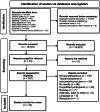The effectiveness of improving healthcare teams' human factor skills using simulation-based training: a systematic review
- PMID: 35526061
- PMCID: PMC9077986
- DOI: 10.1186/s41077-022-00207-2
The effectiveness of improving healthcare teams' human factor skills using simulation-based training: a systematic review
Abstract
Background: Simulation-based training used to train healthcare teams' skills and improve clinical practice has evolved in recent decades. While it is evident that technical skills training is beneficial, the potential of human factor training has not been described to the same extent. Research on human factor training has been limited to marginal and acute care scenarios and often to validate instruments. This systematic review aimed to investigate the effectiveness of simulation-based training in improving in-hospital qualified healthcare teams' human factor skills.
Method: A review protocol outlining the study was registered in PROSPERO. Using the PRISMA guidelines, the systematic search was conducted on September 28th, 2021, in eight major scientific databases. Three independent reviewers assessed title and abstract screening; full texts were evaluated by one reviewer. Content analysis was used to evaluate the evidence from the included studies.
Results: The search yielded 19,767 studies, of which 72 were included. The included studies were published between 2004 and 2021 and covered research from seven different in-hospital medical specialisms. Studies applied a wide range of assessment tools, which made it challenging to compare the effectiveness of human factor skills training across studies. The content analysis identified evidence for the effectiveness. Four recurring themes were identified: (1) Training human factor skills in qualified healthcare teams; (2) assessment of human factor skills; (3) combined teaching methods, and (4) retention and transfer of human factor skills. Unfortunately, the human factor skills assessments are variable in the literature, affecting the power of the result.
Conclusion: Simulation-based training is a successful learning tool to improve qualified healthcare teams' human factor skills. Human factor skills are not innate and appear to be trainable similar to technical skills, based on the findings of this review. Moreover, research on retention and transfer is insufficient. Further, research on the retention and transfer of human factor skills from simulation-based training to clinical practice is essential to gain knowledge of the effect on patient safety.
Keywords: Adverse events; Crisis resource management (CRM); Human factor skills; In-hospital; Medical simulation; Non-technical skills (NTS); Qualified healthcare team; Simulation-based training; Systematic review; Teamwork.
© 2022. The Author(s).
Conflict of interest statement
The authors declare that they have no competing interests.
Figures
References
-
- Styrelsen for Patientsikkerhed. Årsberetning for Dansk PatientsikkerhedsDatabase 2019. Copenhagen: Styrelsen for Patientsikkerhed; 2020.
-
- Styrelsen for Patientsikkerhed. Strategiplan 2017-2021 København. Denmark: Sundhedsstyrelsen; 2021. [Available from: https://patientsikkerhed.dk/content/uploads/2017/06/strategiplan_2017_ko...]
-
- Pedersen KZ, Mesman J. A transactional approach to patient safety: understanding safe care as a collaborative accomplishment. J Interprof Care. 2021;35(4):503–13. 10.1080/13561820.2021.1874317. Epub 2021 Mar 2. - PubMed
-
- Danish Patient Safety Authority. Learning Strategy. In: Danish Patient Safety Authority, editor. Online. 1st Denmark: Danish Patient Safety Authority; 2017.
LinkOut - more resources
Full Text Sources


